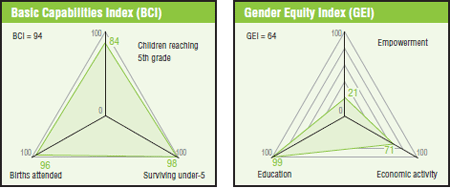Colombia
Implementation of the 2030 Agenda: Are ‘partners’ delivering?
The report for Colombia, by the Asociación Ambiente y Sociedad focuses on the performance of Public Private Partnerships (PPPs) and the major role of private companies in infrastructure development. Colombia’s National Development Plan 2014-2018 introduced the Sustainable Development Objectives 2030, outlining the strategic priorities of the government. Infrastructure, mining, energy and hydrocarbons are deemed essential for those objectives and a legal and institutional framework for PPPs was created. The report looks at some of the problems created by this scheme in the areas of infrastructure and health.
Published on Mon, 2018-09-24 10:35
Angélica Beltrán, Karla Díaz and David Cruz, researchers from Asociación Ambiente y Sociedad of Colombia argue that “extractive industries and atmospheric pollution in the cities are a major source of socio-environmental conflicts”. The report states: “Environmental protection shows a progressive weakening…. Due to the lack of updated environmental information and the simplification of procedures in the granting of permits and licenses, the affected communities find it increasingly difficult to monitor the threats over their land and livelihoods.” Further, environmental control institutions do not have the capacity to oversee extractive activities adequately, which has allowed serious ecocides such as the outcropping of crude oil in the Lizama Block and the violation of environmental rules by Emerald Energy in the Ombu Block, located in the Amazon region. |
Published on Mon, 2017-07-10 13:55
Colombia’s National Development Plan 2014-2018 prioritizes the development of the different productive sectors, mainly the infrastructure sector, energy and mining, as well as hydrocarbons, encouraging the participation of private firms. The Colombian government proposes that the mining-energy and hydrocarbon sectors will play a key role in ensuring sustained and inclusive economic development, as they will generate significant resources to finance investments that serve to consolidate peace and fight against inequality. However, the productive sectors mentioned have been one of the main focuses of social conflict in the country because of their impact on human rights and the environment. |
Published on Wed, 2011-07-06 12:09
Source: Alliance Sud. For five years, non governmental organisation Alliance Sud and swiss food multinational Nestlé have been engaged in a high-level dialogue which is innovative in more than one respect. Alliance Sud, focal point of Social Watch in Switzerland, has led two fact-finding missions into Nestlé’s operations in Colombia. These have produced concrete improvements, although the basic conflict between the multinational and trade unions remains. |
Published on Fri, 2011-06-10 14:09
Sources Black women from Latin America, the Caribbean and Africa demanded this week a firm and final commitment to equality and the end of discrimination from governments and the international community, at the closing of the Second International Meeting of women of African descent held in Cali, Colombia. |
|
Published on Wed, 2004-12-01 16:38
Colombia, August 28 - The Social Watch Report on Privatizations was considered the subject of the day on today's issue of El Colombiano, the second newspaper of greater circulation at national level. |
SUSCRIBE TO OUR NEWSLETTER






